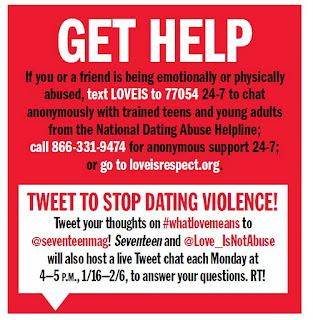The holidays are upon us and we will be around
family and friends that we may not usually see. And what if you see something
that you are concerned about? What if you think someone you care about may not
be in a safe relationship?
Here is the big difficult question: "What do you say to someone if you are concerned that they may be in an abusive relationship?"
Here is one pretty good way that I've found to talk with someone -- granted this is my style and everyone has a different style, but it goes something like this:
"You know I really care a lot about you. I've noticed you haven't been yourself lately, and that (and you would fill in here the other things you've noticed -- for example, the person seems afraid of their boyfriend/girlfriend/husband/wife, has unexplained injuries, seems isolated, etc.). I would rather be wrong or have you mad at me for asking than ever have anything bad happen to you so I just have to check in with you and ask -- are you safe in your relationship?"
Because really, if you think about it, that is the point, isn't it? You WOULD rather be embarrassed or feel uncomfortable asking, or be wrong rather than have something bad happen to a friend of yours and not say something.
And -- so what if your friend tells you that he or she is fine?
Then say: "Hey that’s great. But if you ever decide you aren't ok, I want you to know my door is always open." And you may also want to add, "And if you were ever concerned that I was not safe, I would hope you would ask me the same question, right?"
Because the point is, if we really have one another's backs, we should be able to ask each other these questions. And then if you can, you may want to check in again with your family member or friend again in a few weeks just to see how things are going.
People don't always tell you right away when they are in a relationship that is not safe or good for them. It takes time and it is not easy.
For help or assistance anytime (or just to check things out), call the National Domestic Violence Hotline at 1-800-799-SAFE (7233) or check out http://www.thehotline.org.
Here is the big difficult question: "What do you say to someone if you are concerned that they may be in an abusive relationship?"
Here is one pretty good way that I've found to talk with someone -- granted this is my style and everyone has a different style, but it goes something like this:
"You know I really care a lot about you. I've noticed you haven't been yourself lately, and that (and you would fill in here the other things you've noticed -- for example, the person seems afraid of their boyfriend/girlfriend/husband/wife, has unexplained injuries, seems isolated, etc.). I would rather be wrong or have you mad at me for asking than ever have anything bad happen to you so I just have to check in with you and ask -- are you safe in your relationship?"
Because really, if you think about it, that is the point, isn't it? You WOULD rather be embarrassed or feel uncomfortable asking, or be wrong rather than have something bad happen to a friend of yours and not say something.
And -- so what if your friend tells you that he or she is fine?
Then say: "Hey that’s great. But if you ever decide you aren't ok, I want you to know my door is always open." And you may also want to add, "And if you were ever concerned that I was not safe, I would hope you would ask me the same question, right?"
Because the point is, if we really have one another's backs, we should be able to ask each other these questions. And then if you can, you may want to check in again with your family member or friend again in a few weeks just to see how things are going.
People don't always tell you right away when they are in a relationship that is not safe or good for them. It takes time and it is not easy.
For help or assistance anytime (or just to check things out), call the National Domestic Violence Hotline at 1-800-799-SAFE (7233) or check out http://www.thehotline.org.
Or – for those in dating relationships, check
out the National Dating Abuse Helpline -- on the web at http://www.loveisrespect.org or at
1-866-331-9474.
It never hurts to ask -- and it may help change or save the life of someone you care about.
(And survivors....any comments or additional suggestions you have are most welcome! You know best what is helpful!)
It never hurts to ask -- and it may help change or save the life of someone you care about.
(And survivors....any comments or additional suggestions you have are most welcome! You know best what is helpful!)
















